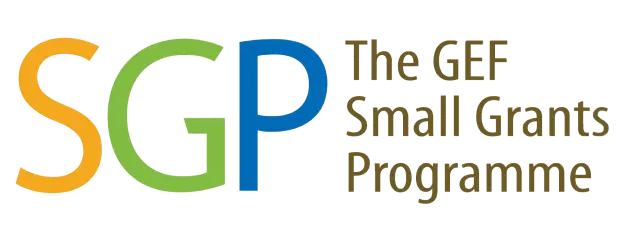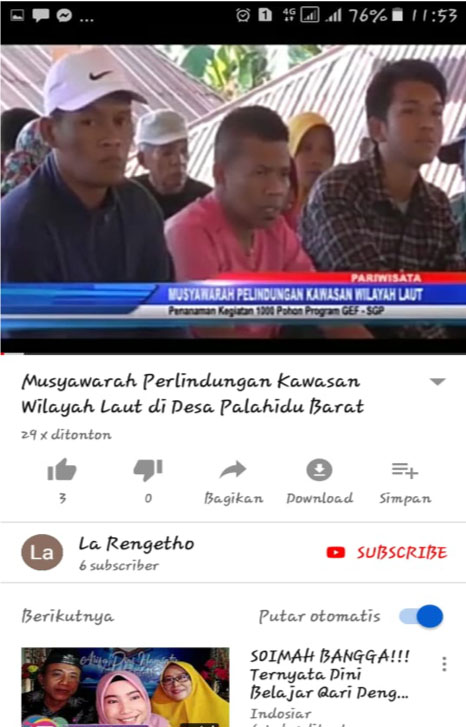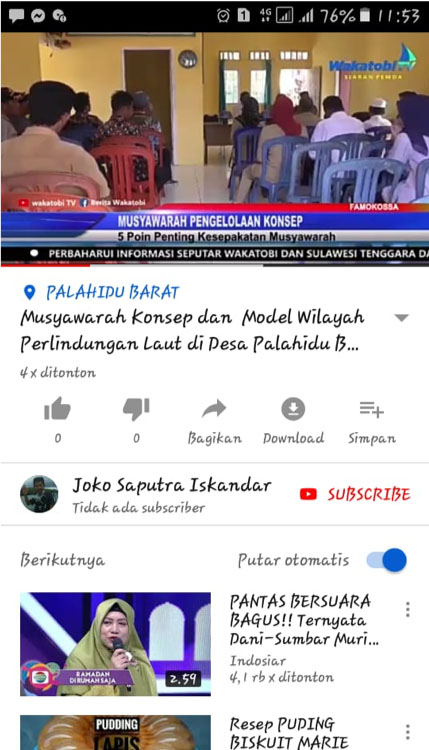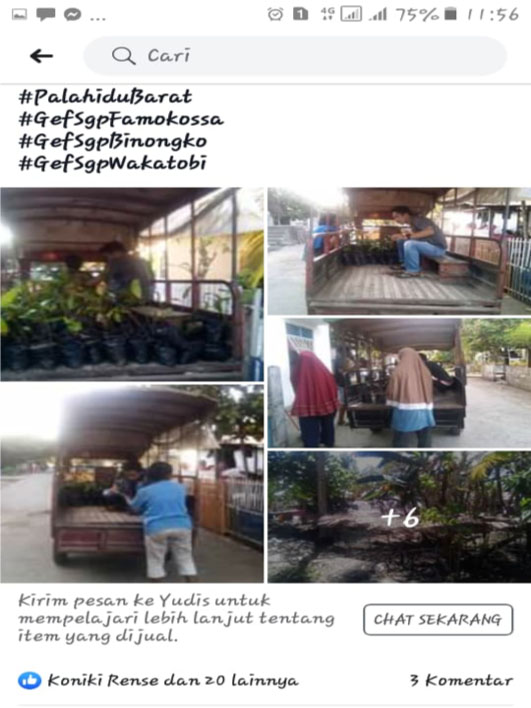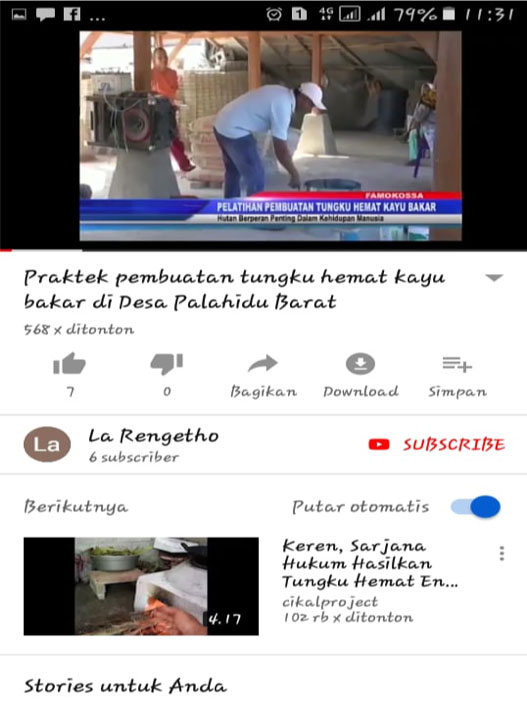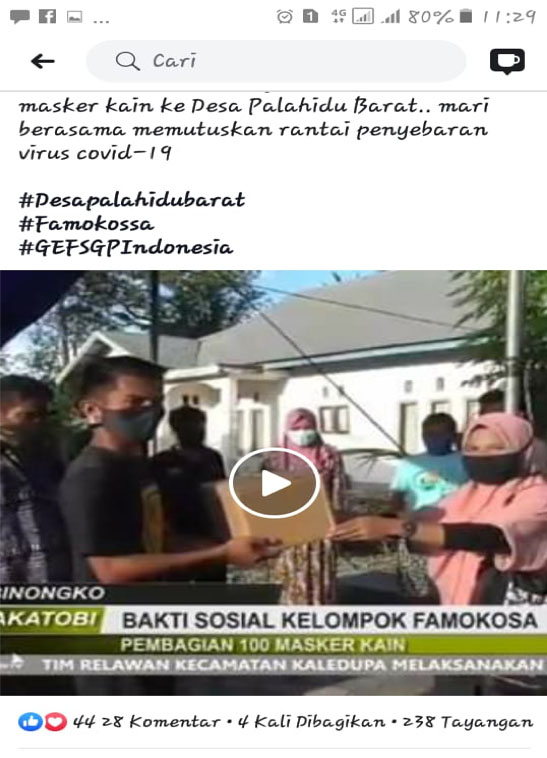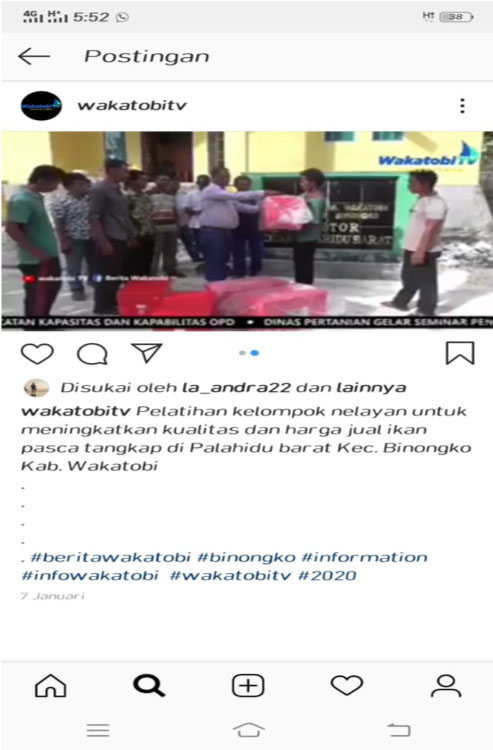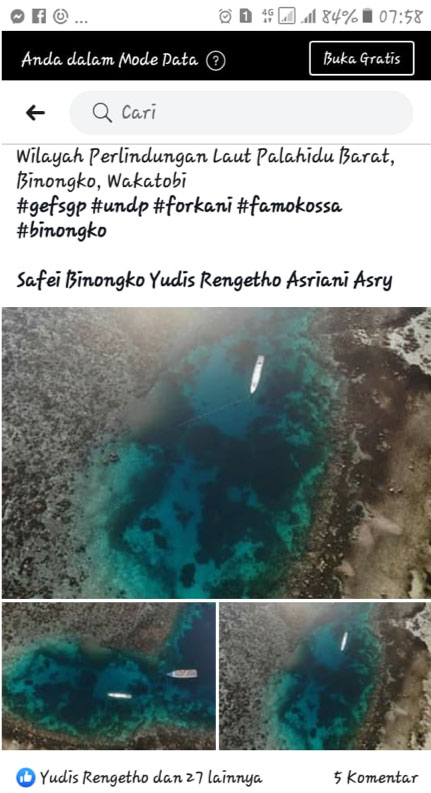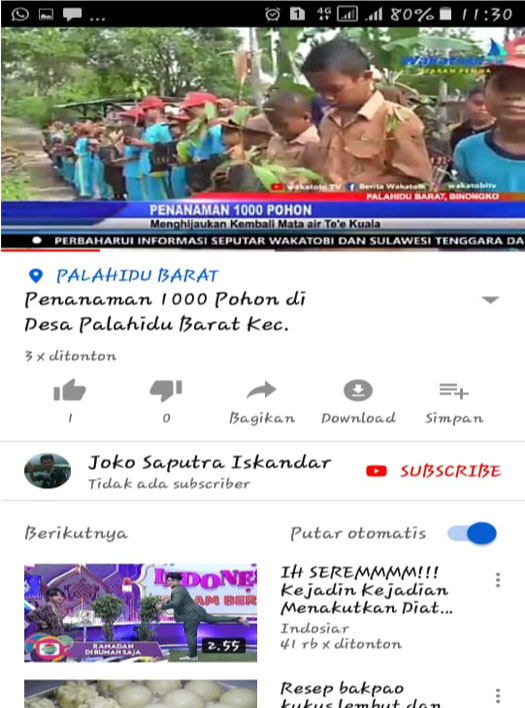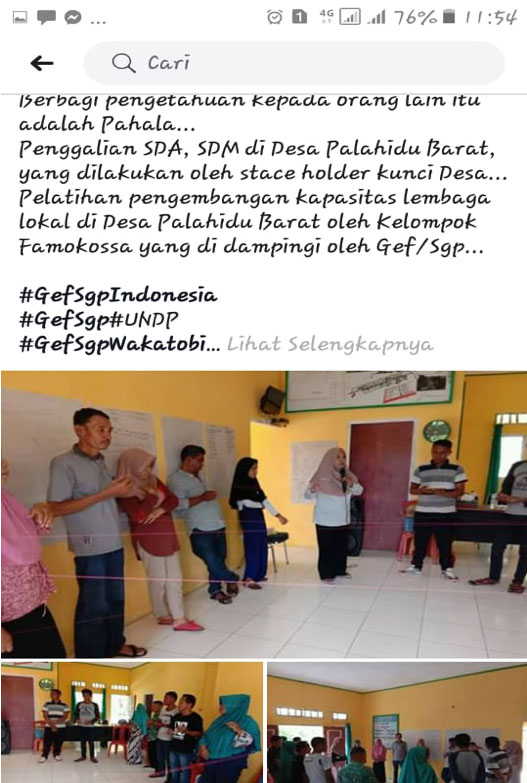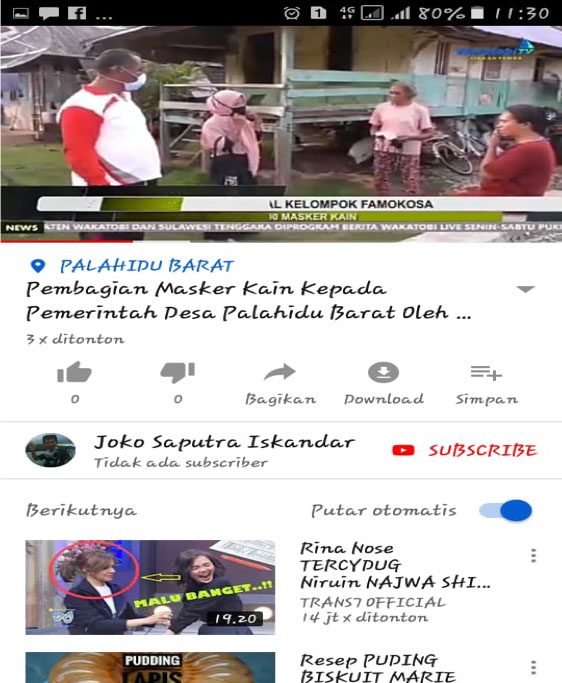By:
(Famokossa)
( INS/SGP/OP6/Y2/STAR/BD/19/057 )
GEF-SGP PHASE IV
Outcome 1:
Maintaining and improving the management of the sea area of West Palahidu Village and increasing sustainable resource utilization practices
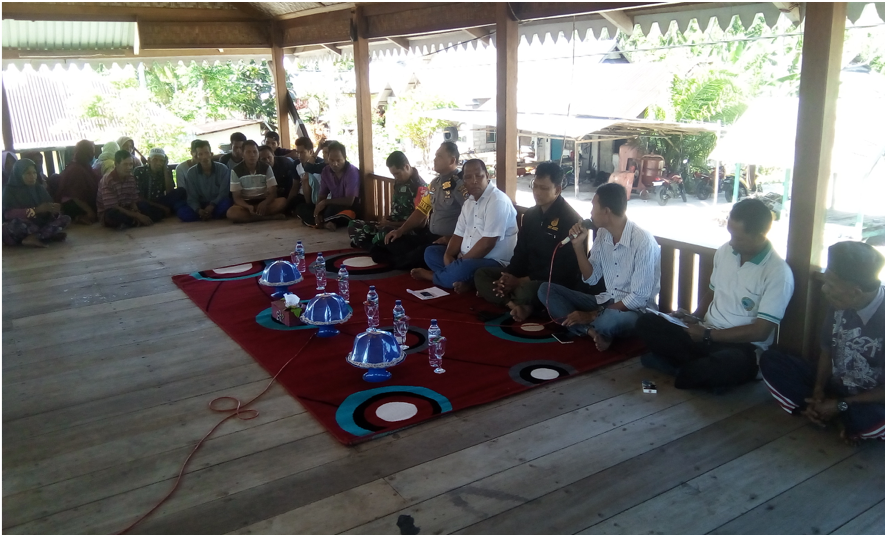
Photo 1.1: Village deliberation regarding marine area protection plans. This activity was carried out to determine and designate the area that will be protected in West Palahidu Village, namely from kollo samplea" to pusinu ou (Sampua Ina Wa Bake covering an area of 10 ha). 44 participants attended, Men: 25 people, Women: 19 people (July 2019).
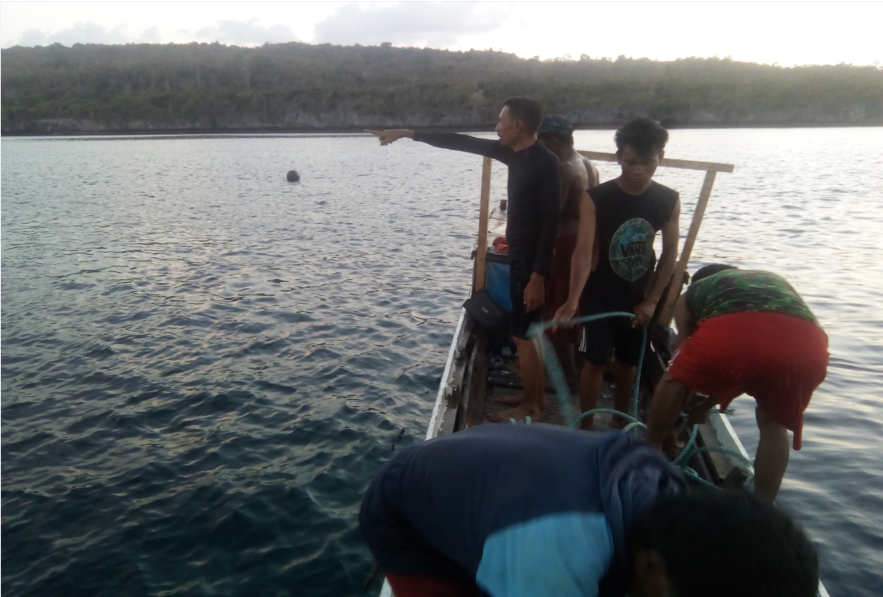
Photo 1.3: Activity of installing boundary signs for marine protected areas, namely from Kollo "sampa" to Pusinu ou (Sampua Ina Wa Bake) West Palahidu Village. This activity was carried out so that the marine protected area could be known to the people of West Palahidu Village and the Binongko community in general, as many as 8 people. 19 participants attended, Men: 15 people, Women: 4 people (November 2019).
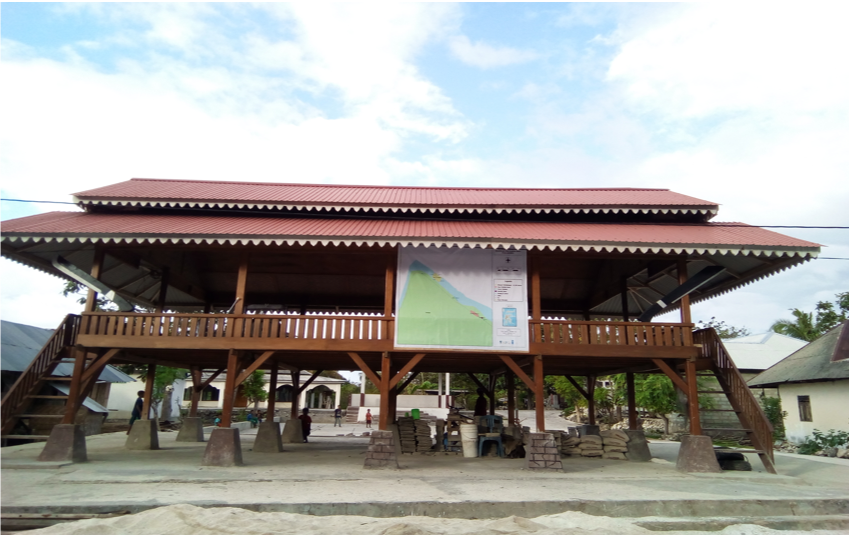
Photo 1.2: One of the maps installed in Baruga, West Palahidu village. This activity was carried out to make it easier for the public to know the location, extent and to make it easier for people to know the location of the marine protected area in West Palahidu Village. 11 participants attended, Men: 9 people, Women: 2 people (December 2020).
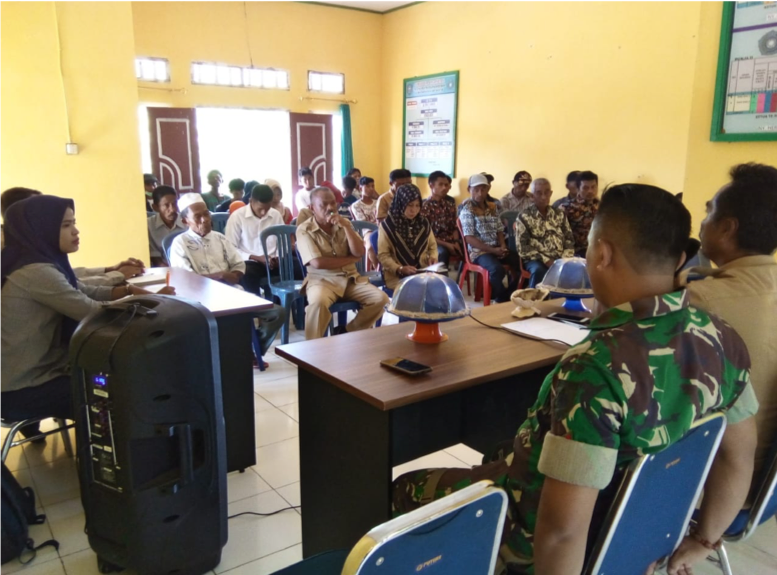
Photo 1.4: Deliberation on agreement on concepts and models for marine area protection. This activity was carried out to agree on the concept and model that will be implemented in the Marine Protected Area which was also attended by the Village Head, Village Head and representatives of fishermen in two villages and two sub-districts. There were 60 participants, Men: 53 people, Women: 7 people (December 2019).
Outcome 2:
Maintain and increase the forest cover area in the Tee Kuala spring area.
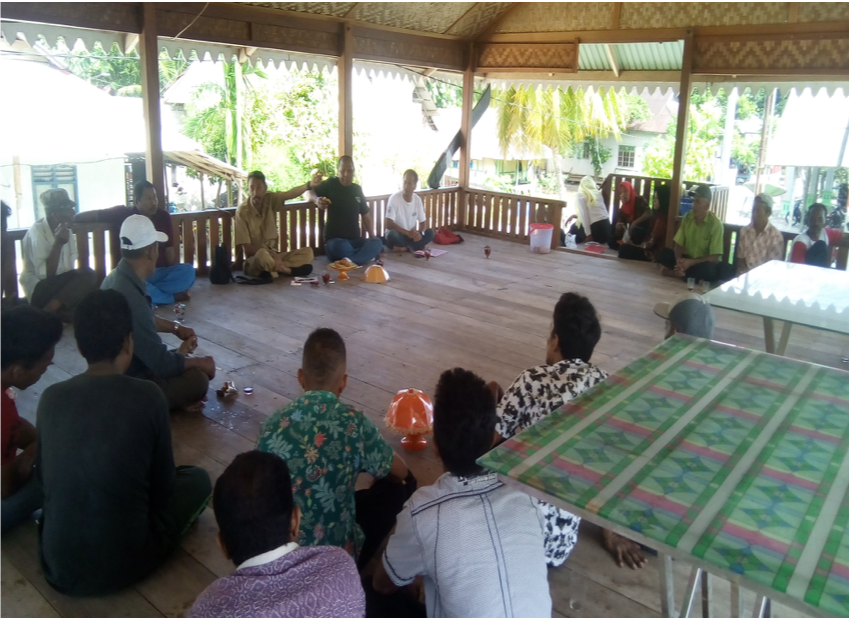
Photo 2.1: Village meeting on agreement on forest protection in the Te'e Kuala Springs area, West Palahidu village. This activity was carried out to determine the location for planting 1,000 local trees in the spring area of West Palahidu village covering an area of 1 ha. 48 participants attended, Men: 13 people, Women: 35 people (July 2019).
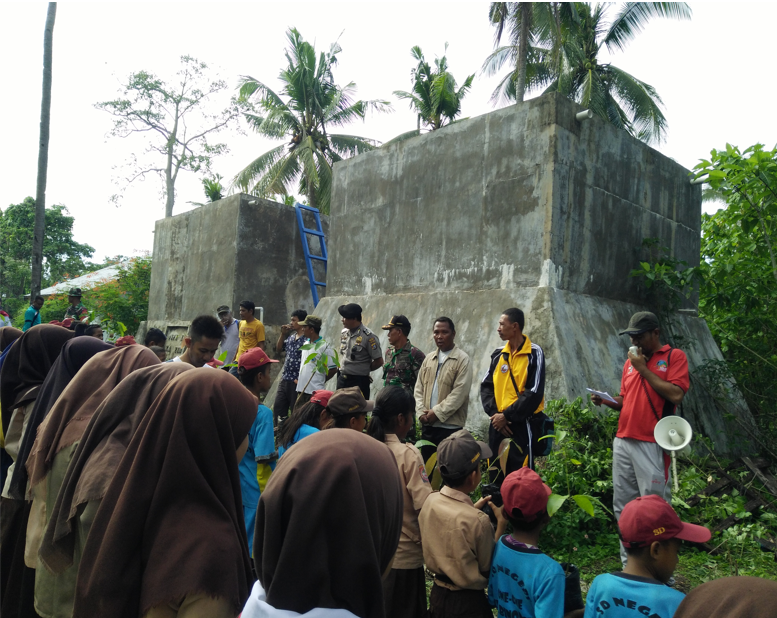
Photo 2.2: Planting activities of 1,000 local trees in the Te'e Kuala spring area, West Palahidu Village. It is hoped that this activity will minimize the taste of the water at the Te'e Kuala spring. There were 126 participants, Men: 66 people, Women: 60 people (January 2020).
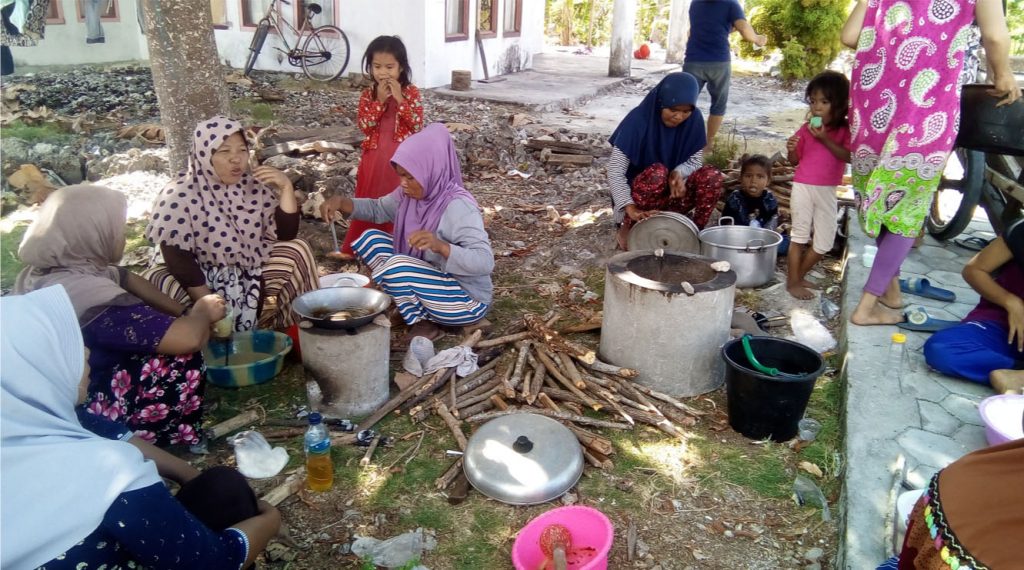
Photo 2.3: Use of a wood-saving stove during a large event in the West Palahidu Village community.
Outcome 3:
Increasing community local food security through better and more sustainable agricultural activities.
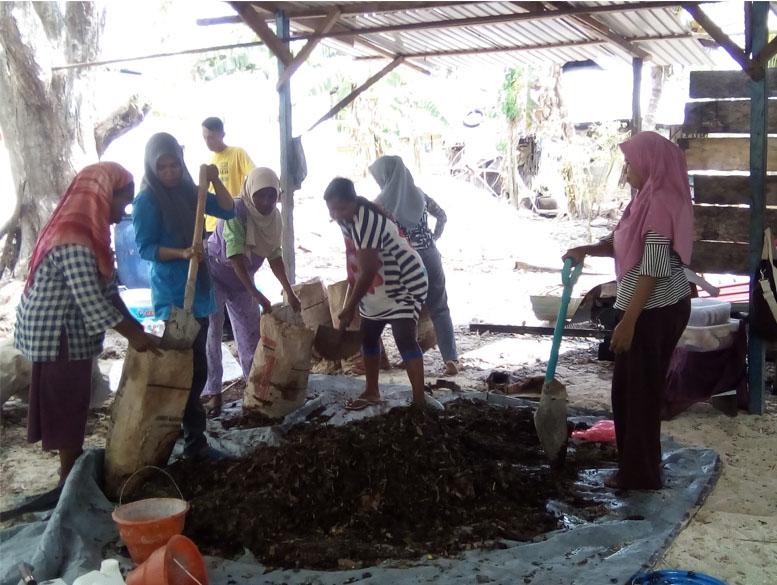
Photo 3.1: Making Compost Fertilizer. This activity was carried out to provide knowledge on how to make environmentally friendly compost fertilizer so that it can be applied on the agricultural land of the West Palahidu Village community. 27 participants attended, Men: 5 people, Women: 22 people (October 2019).
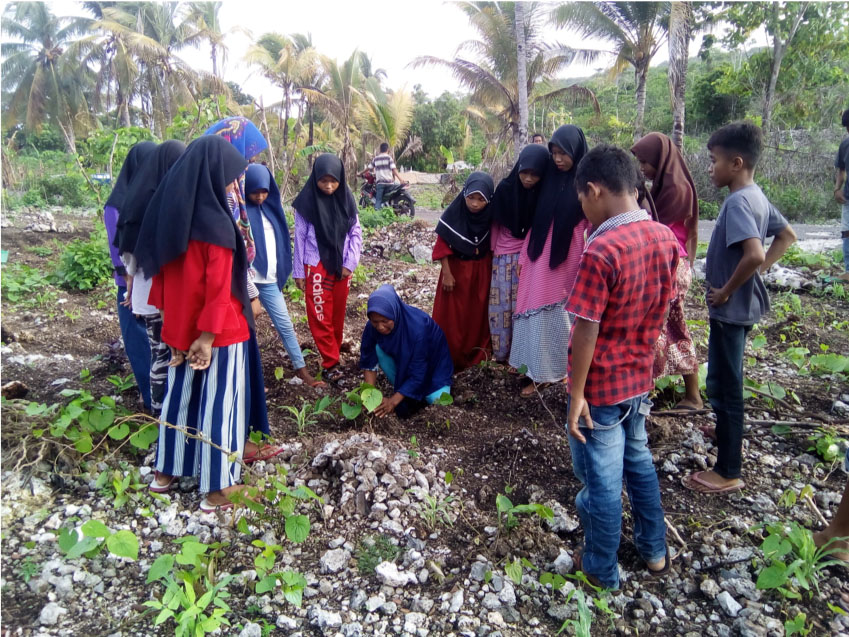
Photo 3.3: Agricultural practices using agricultural technology combined with local knowledge for the young generation in West Palahidu village. This activity is carried out to transfer knowledge to the younger generation about how to make environmentally friendly compost and how to treat it on locally grown food plants. 32 participants attended, Men: 17 people, Women: 15 people (January 2020).
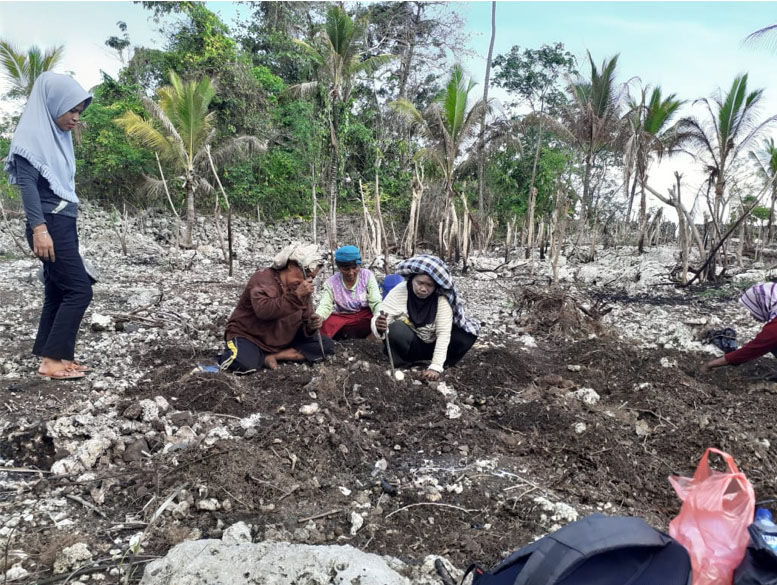
Photo 3.2: Local food planting in demonstration plots. It is hoped that this activity will provide an example to the community to be implemented in the community gardens of West Palahidu village. 11 participants attended, Men: 2 people, Women: 9 people (January 2020).
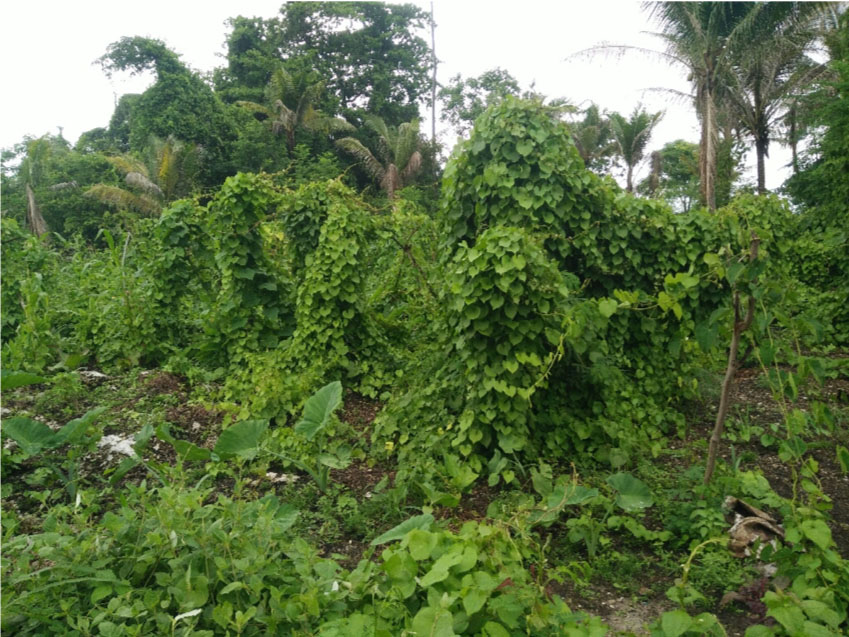
Photo 3.4: Local environmentally friendly agricultural food demonstration plot managed by the West Palahgidu Village Farmers group.
Outcome 4:
Strengthening the role of local institutions for participatory decision making that favors environmental sustainability and community welfare.
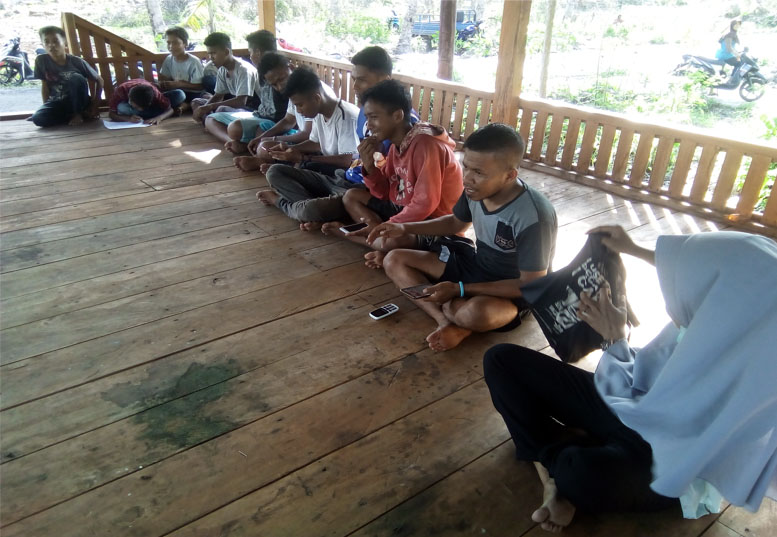
Photo 4.1: Discussion on capacity building for local institutions (Karang Taruna) in West Palahidu Village. There were 46 participants, Men: 17 people, Women: 29 people (January 2020).
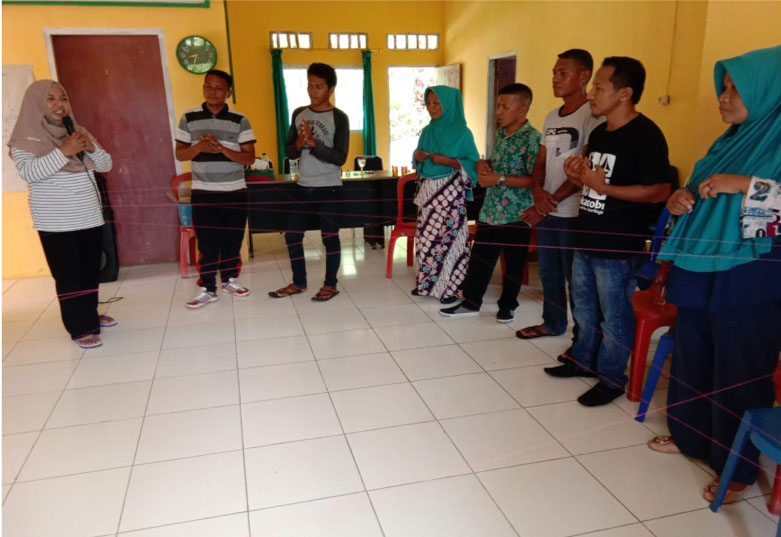
Photo 4.2: Training to increase the capacity of local institutions in West Palahidu village. This activity was carried out to develop the capacity of staceholders and community groups in West Palahidu Village. 24 participants attended, Men: 13 people, Women: 11 people (February 2020).
PROJECT OUTCOMES
- Establishment of an understanding regarding the plan to protect the marine area of West Palahidu Village (all stakeholders agree on the plan to have a marine protected area in the area of West Palahidu Village).
- From the results of village deliberations regarding marine protection plans between ship owners, fishermen, village government, traditional institutions, Wakatobi National Park, the community and partner institutions, a joint memorandum of understanding has been created with the parties and agreed on the location of the marine areas that will be protected.
- It has determined the location and extent of the protected sea, namely from "kollo samplea" to pusinu ou (Sampua Ina Wa Bake) covering an area of 10 ha.
- There is a map of marine protected area areas (There is already a map of the location of marine protected areas installed at 5 points, namely in Taipabu sub-district, Makoro Village (Bante Hamlet), West Palahidu Village Harbor, Baruga West Palhidu Village and the Rukwa and Palahidu Sub-District Pier to make it easier people know the location of protected marine areas).
- Deliberations on agreements regarding marine protected areas and deliberations on concepts and models for managing protected marine areas have been held.
- The socialization of the marine protected area in the West Palahidu village in two villages and 2 sub-districts that was socialized was the location of the marine protected area, namely from "kollo samplea" to pusinu ou (Sampua Ina Wa Bake) covering an area of 10 ha with the name Tauri, a marine protected area management model namely the concept of open and close management, opened every year at the traditional henga-hengapa (picnic) event for 1 day then closed again for the following year's traditional event and the use of environmentally friendly fishing gear.
- Identification of spring sources, land conditions, land owners and types of trees in the spring source area (identification of the Te'e Kauala spring source, which is planned to be planted with 1,100 trees in barren land conditions, rocks, bushes and the surrounding tree species are breadfruit trees, rita trees, tamarind trees, kedondong trees, forest fola trees and jackfruit trees, the rest are shrubs and short-term plants).
- An understanding was established regarding the plan to plant 1,000 trees in the Te'e Kuala spring area in West Palahidu Village (all stace holders agreed to the plan to plant 1,000 trees in the Te'e Kuala spring area in the West Palahidu Village area).
- There has been a village discussion regarding the plan to plant 1,000 trees in the Te'e Kuala spring area in West Palahidu Village between the land owner, community, village government and partner institutions. They have produced a memorandum of understanding with the parties and agreed that the location for planting 1,000 trees is at the source. te'e kuala springs.
- There is a seeding area of 10 x 15 M which was created for seeding 1,100 local trees. (local tree seeds prepared by the community are sown in the aunt's garden that has been created).
- Planting of 1,000 local tree seedlings in the Te'e Kuala spring area covering an area of 1 ha.
- 20 firewood saving stoves were made by the dasawisma group and other communities (9 stoves spread across the community and 11 stoves managed by the village).
- Implementation of environmentally friendly agricultural training for farming communities and other communities: (organizing the production of organic fertilizers (solid and liquid) to increase soil fertility and reduce nomadic farming patterns).
- There is a demonstration garden for the West Palahidu community (There is a demonstration garden for the West Palahidu Village community using environmentally friendly agricultural practices as a learning tool for the younger generation/youth organization carried out by the Famokossa group in collaboration with farmer groups and the West Palahidu Village youth group).
- The implementation of training on processing food products made from local food by the PKK and dasawisma groups thereby increasing the value of processed tuber products (processing sago tubers into chips, cassava leaf chips and taro layered sponge cake/taro flour).
PROJECT IMPACT
Positive impact
- The community is aware that there is a need for a marine protected location that can be used as a place for fish to spawn and be protected together because coral reefs have been damaged due to bombing and fishing activities that are not environmentally friendly.
- Increase community awareness to jointly safeguard and maintain the sustainability and security of marine areas in West Palahidu Village, especially protected areas.
- There is awareness from the people of West Palahidu and stakeholders to maintain the sustainability and security of the sea area of West Palahidu village, namely that they have carried out 2 external vessels that carry out fishing activities using compressors in the West Palahidu area.
- There is community participation in the local tree nursery process.
- There is participation from the community and related stakeholders in the process of planting 1000 local trees.
- With firewood-saving stoves, people who use stoves prefer to cook with energy-saving stoves.
- Village activities such as celebrations and others which previously only used ordinary stoves now use stoves made from training which are shared property in the village.
- Increase public knowledge in making wood-saving stoves.
- Growing public awareness not to use chemical fertilizers.
- The community has understood an environmentally friendly agricultural model that combines technology and local agriculture.
- The PKK and dasawisma groups are aware of the diversification of processing products made from local food.
- Fishermen understand how to handle post-catch fish so they can maintain the quality and hygiene of the fish.
- Increasing the role of institutions in development planning and decision making that is based on environmental sustainability and community welfare.
Negative impact
- There was a response from the public that we would be limited in space/area for fishing and ship owners thought that they could no longer anchor in marine protected areas, while in the west season this location was a place for ships to anchor.
- With this activity, some people think that it is no longer permissible to take wood to use as fuel at the Kuala te'e location.
BEST EXPERIENCE
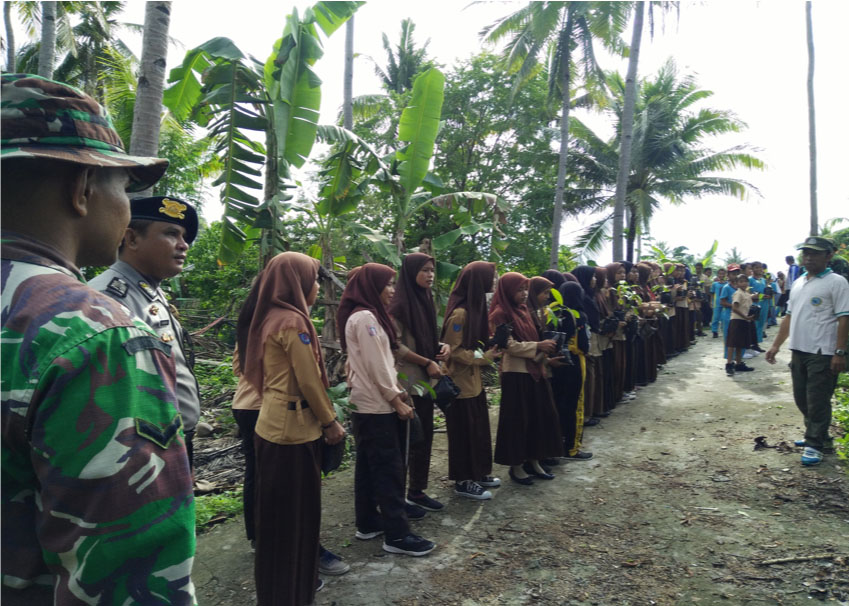
Photo: Planting of 1,000 Local Trees carried out around the Te'e Kuala spring, West Palahidu Village.
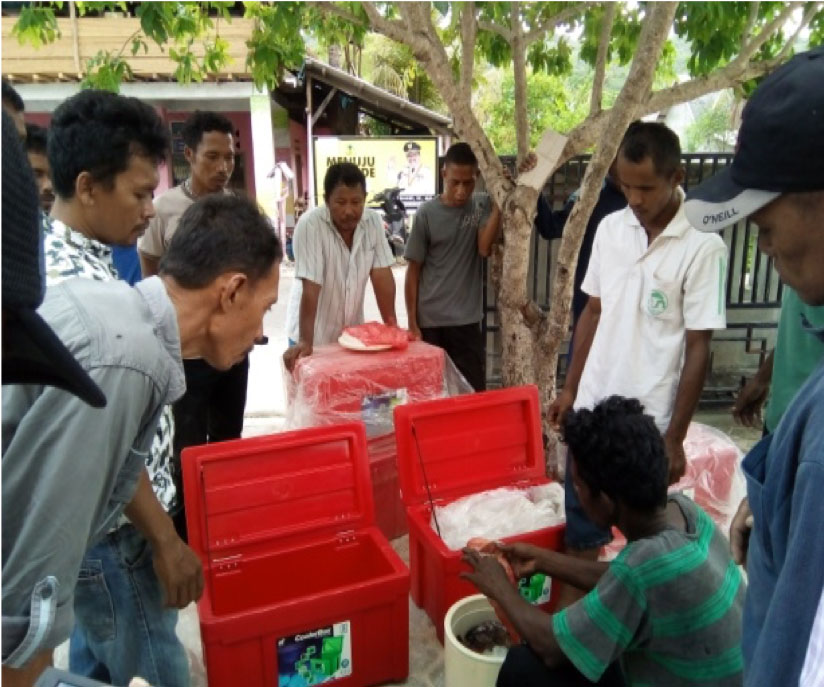
Photo: Post-Catch Fish Training. This activity aims to provide knowledge on how to handle post-catch fish to the Sampua Maola fishermen group, West Palahidu Village.
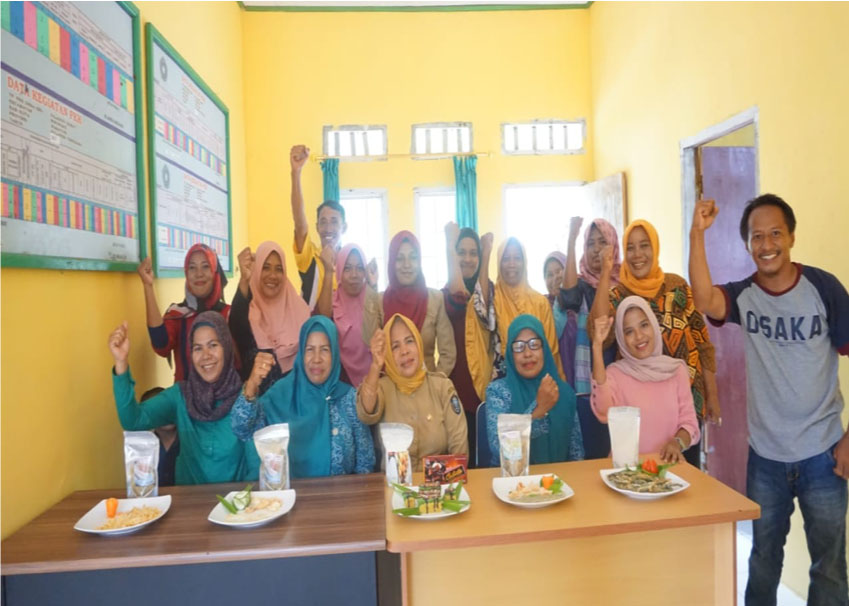
Training on Processing Food Products Made from Local Food which was attended by the Binongko sub-district head.
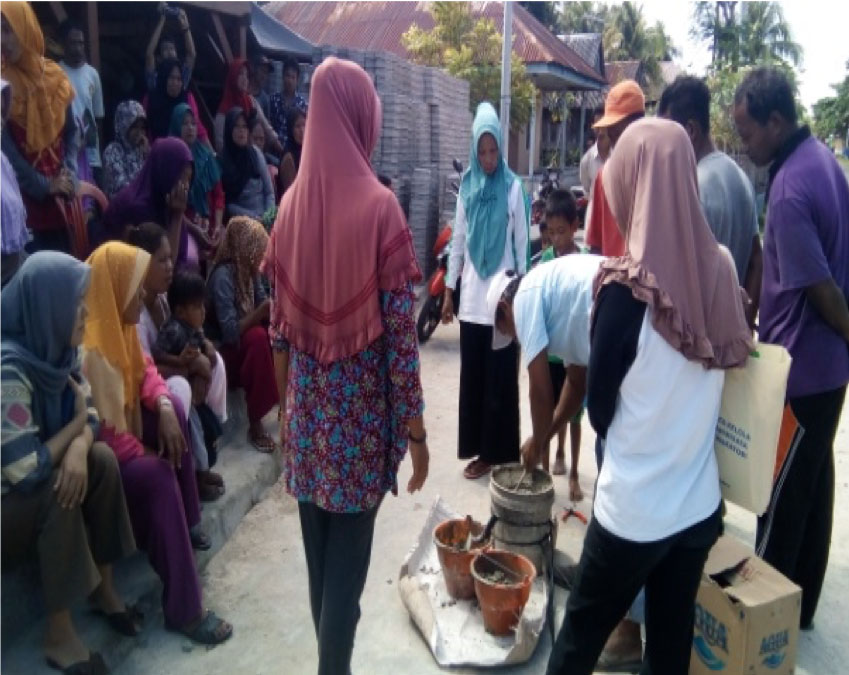
Photo: Procession of making a wood-saving stove in West Palahidu Village. This activity is carried out to reduce the felling of trees and excessive use of firewood.
PROJECT SUSTAINABILITY:
- The growing awareness of the West Palahidu community and stace holders to maintain the sustainability and security of the sea area of West Palahidu village means that they have launched 2 external vessels that carry out fishing activities using compressors in the West Palahidu area.
- There are coral transplantation activities in protected areas carried out by the West Palahidu SPKP accompanied by the National Park.
- The growing role and responsibility of the community in preventing local tree felling in the Te'e Kuala spring area.
- There is recognition from the Head of West Palahidu Village as the land owner, after the GEF-SGP program ends, the village will form a care schedule for the trees that have been planted for the community which will be discussed together after the program ends.
- Furnace construction is included in the RKP Dec.
- There is recognition from the Village Government for the procurement of fish preservatives (ice factory) in West Palahidu Village.
Media and Publications
